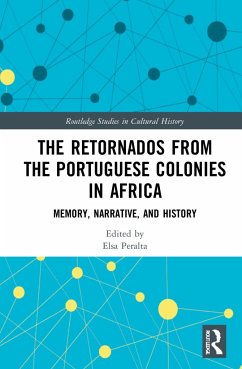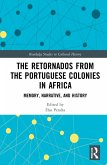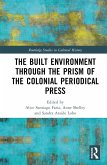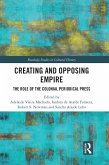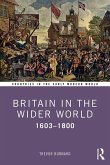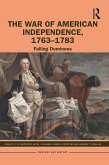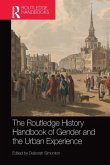The Retornados from the Portuguese Colonies in Africa
Memory, Narrative, and History
Herausgeber: Peralta, Elsa
The Retornados from the Portuguese Colonies in Africa
Memory, Narrative, and History
Herausgeber: Peralta, Elsa
- Gebundenes Buch
- Merkliste
- Auf die Merkliste
- Bewerten Bewerten
- Teilen
- Produkt teilen
- Produkterinnerung
- Produkterinnerung
Placed in the wider scope of post-war European decolonisation migrations, The Retornados from the Portuguese Colonies in Africa looks at the "Return" of the Portuguese nationals living in the African colonies when they became independent.
Andere Kunden interessierten sich auch für
![The Retornados from the Portuguese Colonies in Africa The Retornados from the Portuguese Colonies in Africa]() The Retornados from the Portuguese Colonies in Africa42,99 €
The Retornados from the Portuguese Colonies in Africa42,99 €![The Built Environment through the Prism of the Colonial Periodical Press The Built Environment through the Prism of the Colonial Periodical Press]() The Built Environment through the Prism of the Colonial Periodical Press175,99 €
The Built Environment through the Prism of the Colonial Periodical Press175,99 €![Creating and Opposing Empire Creating and Opposing Empire]() Creating and Opposing Empire152,99 €
Creating and Opposing Empire152,99 €![Britain in the Wider World Britain in the Wider World]() Trevor BurnardBritain in the Wider World40,99 €
Trevor BurnardBritain in the Wider World40,99 €![The Portuguese Armed Forces and the Revolution The Portuguese Armed Forces and the Revolution]() Douglas PorchThe Portuguese Armed Forces and the Revolution34,99 €
Douglas PorchThe Portuguese Armed Forces and the Revolution34,99 €![The War of American Independence, 1763-1783 The War of American Independence, 1763-1783]() Stanley D. M. CarpenterThe War of American Independence, 1763-178339,99 €
Stanley D. M. CarpenterThe War of American Independence, 1763-178339,99 €![The Routledge History Handbook of Gender and the Urban Experience The Routledge History Handbook of Gender and the Urban Experience]() The Routledge History Handbook of Gender and the Urban Experience51,99 €
The Routledge History Handbook of Gender and the Urban Experience51,99 €-
-
-
Placed in the wider scope of post-war European decolonisation migrations, The Retornados from the Portuguese Colonies in Africa looks at the "Return" of the Portuguese nationals living in the African colonies when they became independent.
Produktdetails
- Produktdetails
- Routledge Studies in Cultural History
- Verlag: Taylor & Francis Ltd
- Seitenzahl: 444
- Erscheinungstermin: 10. September 2021
- Englisch
- Abmessung: 235mm x 157mm x 28mm
- Gewicht: 768g
- ISBN-13: 9780367703998
- ISBN-10: 0367703998
- Artikelnr.: 62231883
- Herstellerkennzeichnung
- Libri GmbH
- Europaallee 1
- 36244 Bad Hersfeld
- gpsr@libri.de
- Routledge Studies in Cultural History
- Verlag: Taylor & Francis Ltd
- Seitenzahl: 444
- Erscheinungstermin: 10. September 2021
- Englisch
- Abmessung: 235mm x 157mm x 28mm
- Gewicht: 768g
- ISBN-13: 9780367703998
- ISBN-10: 0367703998
- Artikelnr.: 62231883
- Herstellerkennzeichnung
- Libri GmbH
- Europaallee 1
- 36244 Bad Hersfeld
- gpsr@libri.de
Elsa Peralta is a senior research fellow at the Centre for Comparative Studies (CEC), School of Arts & Humanities, University of Lisbon, Portugal.
Introduction; The history and memory of the Portuguese Return from Africa -
Elsa Peralta; PART I. NARRATIVES OF HISTORY AND MEMORY; Chapter 1 Traumatic
loss, successful integration. The agitated and the soothing memory of the
Return from Portugal's African empire - Christoph Kalter; Chapter 2 The
Jornal O Retornado's readers and the construction of a narrative of the
Return from Africa (1975-1976) - Morgane Delaunay; Chapter 3 Remembering
the Return: Personal narratives of paradox and bewilderment - Elsa Peralta;
Chapter 4 The retornados and their "roots" in Angola. A generational
perspective on the colonial past and the postcolonial present - Irène Dos
Santos; PART II. LITERATURE AND THE WORKINGS OF IMAGINATION; Chapter 5
Acoustic remains: Listening for colonialism and decolonisation in Isabela
Figueiredo's life-writing - Isabel A. Ferreira Gould; Chapter 6 The frizzy
hair of the retornados: "Race" and gender in literature on mixed-race
identities in Portugal -Doris Wieser; Chapter 7 The (des)retorno of
(bi)nationals: real and imagined experiences - Carolina Peixoto; Chapter 8
Retornadiana: The writing of the retornados and the memorialisation of the
Return in postcolonial Portugal - João Pedro George; PART III. MEDIA AND
CULTURAL MEMORY; Chapter 9 Historical reflexivity and artistic reflexivity.
The colonial society in the film Tabu and the naturalisation of the
settlers' gaze - Nuno Domingos; Chapter 10 Negotiating the end of the
Portuguese empire: The retornados' perspective in the TV series Depois do
Adeus - Teresa Pinheiro; Chapter 11 As Time Goes By. Portuguese retornados
and postcolonial melancholia - Marcos Cardão; Chapter 12 Connected colonial
nostalgia: content and interactions of the Retornados e Refugiados de
Angola Facebook group - Bruno Góis; PART IV. REWRITINGS AND ARTISTIC
APPROPRIATIONS; Chapter 13 Some of the children of it all. Reflections on
Children of the Return [ Filhos do Retorno] , a performance by Teatro do
Vestido: constructions, representations, memories and postmemories - Joana
Craveiro; Chapter 14 Rewriting recent Portuguese colonial history through
postcolonial documentary theatre - André Amálio; Chapter 15 My own
recollection of their lives: Visual narratives of an archival
reappropriation - Céline Gaille; Chapter 16 The retornado as archive of the
sensible in contemporary Portuguese artistic practices: between
transmemories, nostalgias and possible futures - Maria-Benedita Basto
Elsa Peralta; PART I. NARRATIVES OF HISTORY AND MEMORY; Chapter 1 Traumatic
loss, successful integration. The agitated and the soothing memory of the
Return from Portugal's African empire - Christoph Kalter; Chapter 2 The
Jornal O Retornado's readers and the construction of a narrative of the
Return from Africa (1975-1976) - Morgane Delaunay; Chapter 3 Remembering
the Return: Personal narratives of paradox and bewilderment - Elsa Peralta;
Chapter 4 The retornados and their "roots" in Angola. A generational
perspective on the colonial past and the postcolonial present - Irène Dos
Santos; PART II. LITERATURE AND THE WORKINGS OF IMAGINATION; Chapter 5
Acoustic remains: Listening for colonialism and decolonisation in Isabela
Figueiredo's life-writing - Isabel A. Ferreira Gould; Chapter 6 The frizzy
hair of the retornados: "Race" and gender in literature on mixed-race
identities in Portugal -Doris Wieser; Chapter 7 The (des)retorno of
(bi)nationals: real and imagined experiences - Carolina Peixoto; Chapter 8
Retornadiana: The writing of the retornados and the memorialisation of the
Return in postcolonial Portugal - João Pedro George; PART III. MEDIA AND
CULTURAL MEMORY; Chapter 9 Historical reflexivity and artistic reflexivity.
The colonial society in the film Tabu and the naturalisation of the
settlers' gaze - Nuno Domingos; Chapter 10 Negotiating the end of the
Portuguese empire: The retornados' perspective in the TV series Depois do
Adeus - Teresa Pinheiro; Chapter 11 As Time Goes By. Portuguese retornados
and postcolonial melancholia - Marcos Cardão; Chapter 12 Connected colonial
nostalgia: content and interactions of the Retornados e Refugiados de
Angola Facebook group - Bruno Góis; PART IV. REWRITINGS AND ARTISTIC
APPROPRIATIONS; Chapter 13 Some of the children of it all. Reflections on
Children of the Return [ Filhos do Retorno] , a performance by Teatro do
Vestido: constructions, representations, memories and postmemories - Joana
Craveiro; Chapter 14 Rewriting recent Portuguese colonial history through
postcolonial documentary theatre - André Amálio; Chapter 15 My own
recollection of their lives: Visual narratives of an archival
reappropriation - Céline Gaille; Chapter 16 The retornado as archive of the
sensible in contemporary Portuguese artistic practices: between
transmemories, nostalgias and possible futures - Maria-Benedita Basto
Introduction; The history and memory of the Portuguese Return from Africa -
Elsa Peralta; PART I. NARRATIVES OF HISTORY AND MEMORY; Chapter 1 Traumatic
loss, successful integration. The agitated and the soothing memory of the
Return from Portugal's African empire - Christoph Kalter; Chapter 2 The
Jornal O Retornado's readers and the construction of a narrative of the
Return from Africa (1975-1976) - Morgane Delaunay; Chapter 3 Remembering
the Return: Personal narratives of paradox and bewilderment - Elsa Peralta;
Chapter 4 The retornados and their "roots" in Angola. A generational
perspective on the colonial past and the postcolonial present - Irène Dos
Santos; PART II. LITERATURE AND THE WORKINGS OF IMAGINATION; Chapter 5
Acoustic remains: Listening for colonialism and decolonisation in Isabela
Figueiredo's life-writing - Isabel A. Ferreira Gould; Chapter 6 The frizzy
hair of the retornados: "Race" and gender in literature on mixed-race
identities in Portugal -Doris Wieser; Chapter 7 The (des)retorno of
(bi)nationals: real and imagined experiences - Carolina Peixoto; Chapter 8
Retornadiana: The writing of the retornados and the memorialisation of the
Return in postcolonial Portugal - João Pedro George; PART III. MEDIA AND
CULTURAL MEMORY; Chapter 9 Historical reflexivity and artistic reflexivity.
The colonial society in the film Tabu and the naturalisation of the
settlers' gaze - Nuno Domingos; Chapter 10 Negotiating the end of the
Portuguese empire: The retornados' perspective in the TV series Depois do
Adeus - Teresa Pinheiro; Chapter 11 As Time Goes By. Portuguese retornados
and postcolonial melancholia - Marcos Cardão; Chapter 12 Connected colonial
nostalgia: content and interactions of the Retornados e Refugiados de
Angola Facebook group - Bruno Góis; PART IV. REWRITINGS AND ARTISTIC
APPROPRIATIONS; Chapter 13 Some of the children of it all. Reflections on
Children of the Return [ Filhos do Retorno] , a performance by Teatro do
Vestido: constructions, representations, memories and postmemories - Joana
Craveiro; Chapter 14 Rewriting recent Portuguese colonial history through
postcolonial documentary theatre - André Amálio; Chapter 15 My own
recollection of their lives: Visual narratives of an archival
reappropriation - Céline Gaille; Chapter 16 The retornado as archive of the
sensible in contemporary Portuguese artistic practices: between
transmemories, nostalgias and possible futures - Maria-Benedita Basto
Elsa Peralta; PART I. NARRATIVES OF HISTORY AND MEMORY; Chapter 1 Traumatic
loss, successful integration. The agitated and the soothing memory of the
Return from Portugal's African empire - Christoph Kalter; Chapter 2 The
Jornal O Retornado's readers and the construction of a narrative of the
Return from Africa (1975-1976) - Morgane Delaunay; Chapter 3 Remembering
the Return: Personal narratives of paradox and bewilderment - Elsa Peralta;
Chapter 4 The retornados and their "roots" in Angola. A generational
perspective on the colonial past and the postcolonial present - Irène Dos
Santos; PART II. LITERATURE AND THE WORKINGS OF IMAGINATION; Chapter 5
Acoustic remains: Listening for colonialism and decolonisation in Isabela
Figueiredo's life-writing - Isabel A. Ferreira Gould; Chapter 6 The frizzy
hair of the retornados: "Race" and gender in literature on mixed-race
identities in Portugal -Doris Wieser; Chapter 7 The (des)retorno of
(bi)nationals: real and imagined experiences - Carolina Peixoto; Chapter 8
Retornadiana: The writing of the retornados and the memorialisation of the
Return in postcolonial Portugal - João Pedro George; PART III. MEDIA AND
CULTURAL MEMORY; Chapter 9 Historical reflexivity and artistic reflexivity.
The colonial society in the film Tabu and the naturalisation of the
settlers' gaze - Nuno Domingos; Chapter 10 Negotiating the end of the
Portuguese empire: The retornados' perspective in the TV series Depois do
Adeus - Teresa Pinheiro; Chapter 11 As Time Goes By. Portuguese retornados
and postcolonial melancholia - Marcos Cardão; Chapter 12 Connected colonial
nostalgia: content and interactions of the Retornados e Refugiados de
Angola Facebook group - Bruno Góis; PART IV. REWRITINGS AND ARTISTIC
APPROPRIATIONS; Chapter 13 Some of the children of it all. Reflections on
Children of the Return [ Filhos do Retorno] , a performance by Teatro do
Vestido: constructions, representations, memories and postmemories - Joana
Craveiro; Chapter 14 Rewriting recent Portuguese colonial history through
postcolonial documentary theatre - André Amálio; Chapter 15 My own
recollection of their lives: Visual narratives of an archival
reappropriation - Céline Gaille; Chapter 16 The retornado as archive of the
sensible in contemporary Portuguese artistic practices: between
transmemories, nostalgias and possible futures - Maria-Benedita Basto

